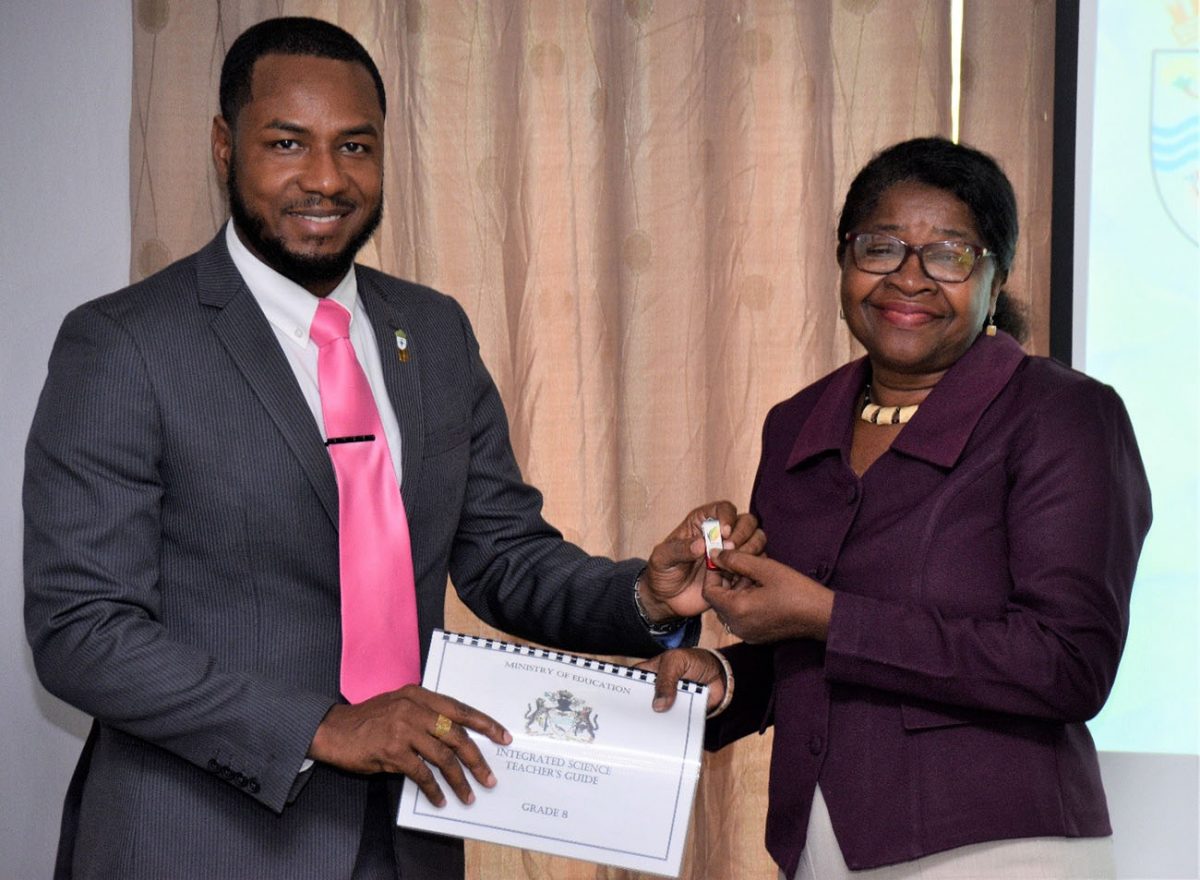The Department of the Environment (DoE) handed over revised Curriculum Guides for Social Studies, Integrated Science, Agricultural Science and English to the Ministry of Education’s NCERD at a ceremony yesterday.
According to a Ministry of the Presidency release, the modifications to the guides were undertaken by an Environment-in-Education Mainstreaming Working Group. This was set up by the Department in October 2018, under the Strengthening the Technical Capacities to Mainstream and Monitor Rio Convention Implementation through Policy Coordination, and targeted Grades One to Nine.
National Centre for Educational Resource Development (NCERD) Director Jennifer Cumberbatch received copies of the guides during the ceremony held at Herdmanston Lodge, Queenstown, Georgetown. She thanked the DoE for the efforts made, and emphasised the importance of these revised guides to the development of the nation’s children.
“NCERD is the home of curriculum, so we are really grateful and thankful at this time,” she said, adding that from what she has seen thus far, the modifications are “really good.”
Chair of the Working Group, Alvin Doris said that the grouping was comprised of specialists in four key disciplines within the field of environment – Agriculture and Forestry,
Biodiversity, Climate Change and Land Geology and Geography. He explained that these persons reviewed the schools’ curriculum guides in the aforementioned subject areas to establish whether there was “comprehensive environmental coverage … and as you would imagine there was little to none because our schools’ curriculum had not been revised in part of decades.”
He observed that it is now up to NCERD to embrace the modifications made by the Department, which captures its vision for what the schools’ curriculum should represent in keeping with the Department’s environmental coverage.
Project Manager of the Rio Mainstreaming Project, Michelle Klass, said the exercise which culminated with yesterday’s ceremony “would see our children benefitting from an updated curriculum that incorporates not only the Rio Conventions that the project is focusing on, but other important aspects of the environment including our Green State Development Strategy.”
The four-year project which is funded by the Government of Guyana, United Nations Development Programme (UNDP) and the Global Environmental Facility (GEF) is intended to strengthen the technical capacities of agencies and personnel in mainstreaming and monitoring the achievement of the Rio Conventions. The three Rio Conventions are: The United Nations Framework Convention on Climate Change, The United Nations Convention on Biological Diversity and The United Nations Convention to Combat Desertification
She disclosed that the Department has developed a user-friendly website which caters for the young population and is currently working on establishing an Environmental Informa-tion Management and Monitoring System, which is a national platform for the public to access environmental information.
“This platform will seek to establish a network of existing environmental databases in Guyana to boost and to share environmental data. The environmental data from this platform is expected to be accessed by the public and be utilised to make better decisions in our day-to-day planning, in our reporting on the conventions as well as to have information readily available for reporting on the Rio Conventions,” Klass was quoted as saying.
Onika Stellingburg, the Stakeholder Management Coordinator at the Department of Environ-ment posited that the curriculum should also be appropriately modified for hinterland students, particularly where the Indigenous languages are still being used.
Three private schools – Mae’s Schools, Marian Academy and School of the Nations – have indicated a willingness to participate in a pilot project, once the changes are accepted by NCERD.










